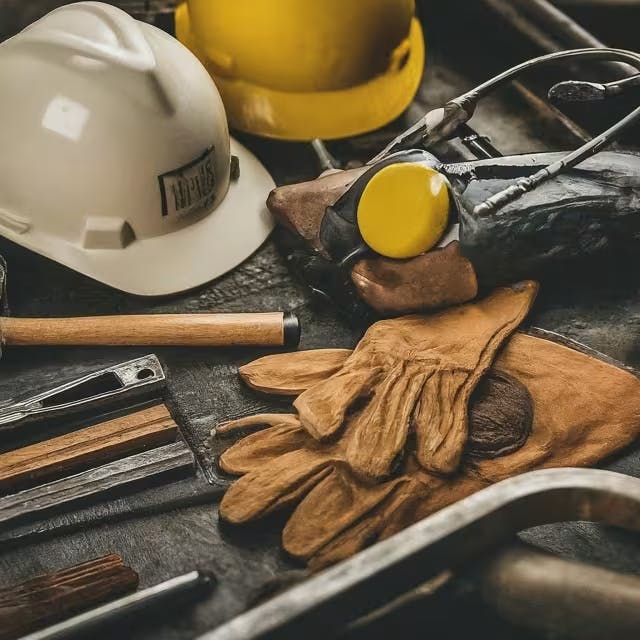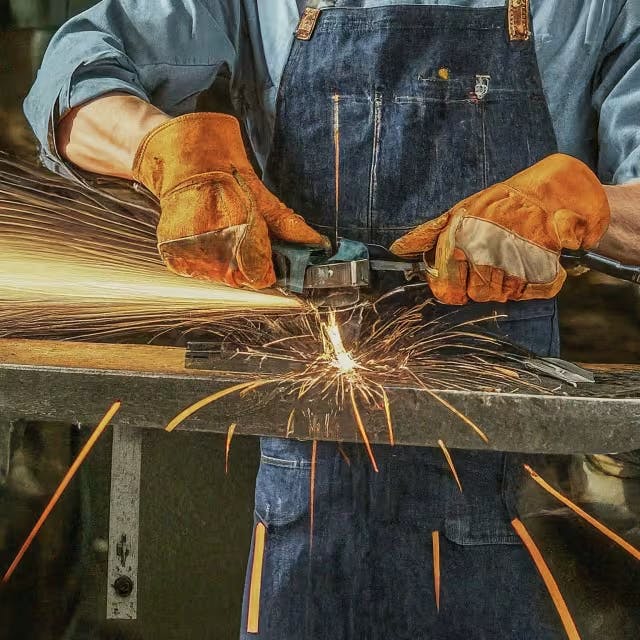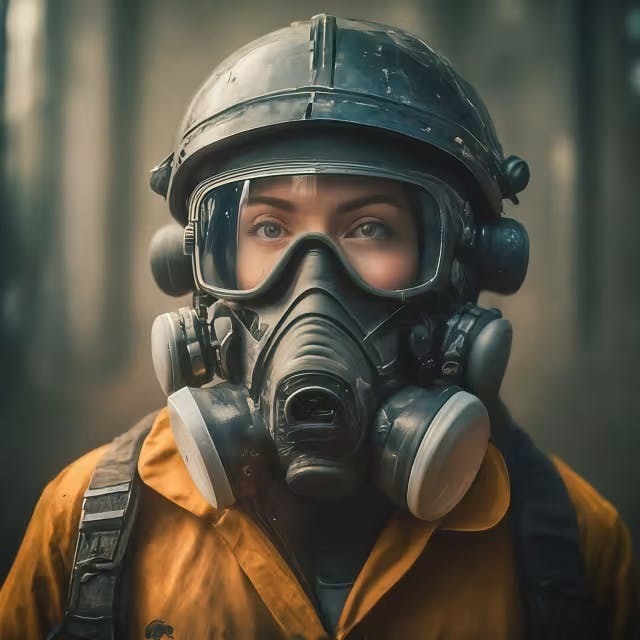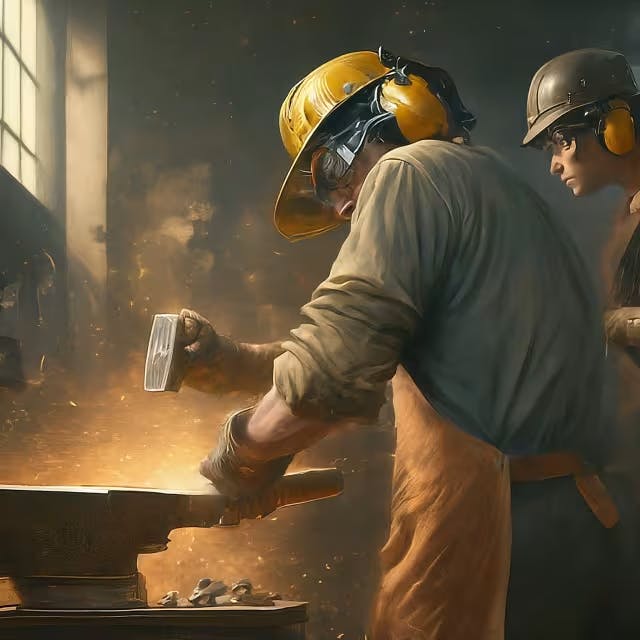Essential Safety Items for Metalworking
Abana Chapter
February 26, 2024

Metalworking, a craft honed over millennia, has evolved from simple tool creation to the complex precision of modern manufacturing, employing advanced tools like CAD and CNC machines. This evolution has expanded the possibilities of metal structures but also underscored the importance of prioritizing safety in metalworking environments. Understanding the essential safety items for metalworking is crucial for workers and hobbyists alike to navigate the inherent risks of this craft and ensure a safe, productive workspace.
Key Takeaways
Safety in metalworking encompasses a broad range of protective measures, starting with essential personal protective equipment (PPE) to guard against common hazards.
Proper use of safety gloves is critical in metal fabrication, not only to prevent cuts and abrasions but also to mitigate the risk of contact with hazardous substances.
Eye protection in metalworking shops is paramount due to the high risk of flying debris, sparks, and exposure to harmful light emissions from welding.
Respiratory safety through the use of masks and effective ventilation systems is essential to protect against inhaling harmful dust, fumes, and vapors prevalent in metalworking environments.
Ear protection plays a crucial role in minimizing occupational hearing loss, a significant risk given the high noise levels in metalworking.
Ensuring a thorough understanding and application of these safety measures significantly contributes to a safer, more productive metalworking workspace.
Essential Personal Protective Equipment for Metalworking
When engaging in metalworking, prioritizing safety can't be overstated. A comprehensive selection of personal protective equipment (PPE) addresses the array of risks faced, from sharp objects and splinters to extreme temperatures and harmful dust. Essentials include safety goggles or face shields to prevent eye injuries and respiratory masks that filter out harmful particulates. Durable gloves protect hands not just from cuts but also from heat and chemicals. Ear protection is vital in environments with constant loud noise, helping prevent long-term hearing damage. Additionally, wearing flame-resistant clothing can guard against sparks and molten metal splashes. To further enhance workplace safety, combining these items with the knowledge of the top metalworking tools and their proper use is invaluable. For detailed guidance on selecting and using PPE effectively, including free checklists and online training recommendations, visit this resource.
Proper Use of Safety Gloves in Metal Fabrication
Selecting the right safety gloves is vital for any metalworker. The variety of tasks in metal fabrication means no one glove fits all jobs. For handling sharp metals, gloves made from cut-resistant materials like Kevlar are advisable. However, for welding or working with high temperatures, gloves with thermal insulation are necessary. It's crucial to replace gloves regularly and inspect them for wear and tear to ensure optimal protection. For further guidance on choosing the right type of gloves and maintenance tips, visit this informative article on safety gloves for blacksmiths. Remember, protection is paramount in metalworking, and the right gloves can significantly reduce the risk of injuries.

The Importance of Eye Protection in Metalworking Shops
When working with metal, protecting one’s eyes is non-negotiable. Metal shards, sparks, and hazardous materials present real threats to eye safety. Recognizing these dangers, types of eye protection such as safety glasses, goggles, and face shields are vital, each serving a unique purpose.
Safety Glasses: Ideal for general protection, equipped with side shields for lateral coverage.
Goggles: Offer a secure fit, protecting against dust, splashes, and impact.
Face Shields: Provide full face coverage, crucial when dealing with heavy, flying debris.
Choosing the right type hinges on the specific task at hand. For example, welding activities require robust face shields, while grinding or cutting metal might necessitate safety glasses or goggles for optimal protection. For tasks that involve prolonged exposure to hazards, combining these options might be best to ensure comprehensive safety.
Eye safety in metalworking isn't just about wearing protection; it’s also about selecting quality gear that meets safety standards. Regular checks for damage and proper cleaning practices extend the lifespan of these protective items and maintain clear vision, a critical aspect of safe metalworking.
To dive deeper into gear specifics, exploring essential welding supplies could provide further insights into choosing the right auto-darkening helmets and safety gear.
Remember, overlooking eye protection can lead to severe injuries or permanent damage. Ensuring you have the correct gear at hand is a straightforward yet effective step toward a safer work environment. For more detailed guidelines on eye protection standards and recommendations, this resource offers valuable information.

Ensuring Respiratory Safety: Masks and Ventilation Systems
When diving into metalworking, one cannot overlook the significance of respiratory protection. Dust, fumes, and other airborne particles present in metalworking environments pose serious health risks. To counteract these hazards, equipping yourself with high-quality masks is a crucial step. Consider options like N95 respirators for filtering out particulate matter or full-face masks for comprehensive protection against chemicals and fumes. Moreover, integrating effective ventilation systems in your workspace is equally important. These systems help dissipate harmful air contaminants, ensuring a safer breathing environment. By prioritizing these respiratory safety measures, you're not only safeguarding your health but also enhancing the overall safety and efficiency of your metalworking projects. For more insights into maintaining a healthy work environment, explore strategies on choosing the best coal and coke for blacksmith forges, which emphasizes the importance of health and environmental considerations in metalworking.

The Role of Ear Protection in Minimizing Occupational Hearing Loss in Metalworking
Occupational noise poses a significant risk of hearing loss for those in the metalworking industry. Protecting your ears goes beyond simply decreasing noise levels; it's a critical step in preserving hearing over the course of your career. Ear protection, from foam plugs to noise-canceling earmuffs, proves indispensable. Given that noise-induced hearing loss (NIHL) affects a considerable percentage of workers globally, with an article from Springer highlighting occupational groups such as military and construction workers among those most at risk, it emphasizes the necessity of ear protection. The research also underscores the differing impacts based on factors like gender and lifestyle choices, further illustrating the complexity of NIHL. In metalworking, where machinery and tools generate high decibel levels, selecting the right ear protection can make all the difference. To ensure a safe and productive environment in metalworking, it is imperative to equip oneself with essential safety items, including protective gloves, eye gear, respiratory masks, ear protection, and appropriate clothing. These tools are not just accessories but vital shields against the common hazards present in metalworking tasks. By adhering to these safety practices, workers can significantly reduce their risk of injuries and long-term occupational hazards, ensuring a healthier and more secure workplace.
Frequently Asked Questions
What are the essential safety items for metalworking to protect against a variety of risks?
When engaging in metalworking, essential safety items include:
Safety goggles or face shields for eye protection against metal shards and sparks.
Respiratory masks such as N95 respirators to filter out harmful dust and fumes.
Durable gloves, including cut-resistant or thermally insulated options, depending on the task.
Ear protection like foam plugs or noise-canceling earmuffs to prevent hearing loss.
Flame-resistant clothing to protect against sparks and molten metal splashes.
Regular inspection and maintenance of these items ensure they provide the maximum level of protection.
How can selecting the right gloves significantly reduce the risk of injuries in metalworking?
Selecting the right safety gloves is vital for any metalworker. The variety of tasks in metal fabrication means no one glove fits all jobs. For handling sharp metals, gloves made from cut-resistant materials like Kevlar are advisable. However, for welding or working with high temperatures, gloves with thermal insulation are necessary. It's crucial to replace gloves regularly and inspect them for wear and tear to ensure optimal protection. For further guidance on choosing the right type of gloves and maintenance tips, visit this informative article on safety gloves for blacksmiths. Remember, protection is paramount in metalworking, and the right gloves can significantly reduce the risk of injuries.
Why is protecting one's eyes with the appropriate gear crucial in metalworking?
Protecting one's eyes in metalworking is crucial due to the high risk of injury from metal shards, sparks, and hazardous materials. The selection of appropriate eye protection, including safety glasses for general protection, goggles for a secure fit against dust and splashes, and face shields for full face coverage against heavy debris, is essential based on the specific metalworking task. Ensuring the use of quality gear that meets safety standards, conducting regular checks for damage, and proper cleaning are vital practices to maintain clear vision and prevent severe eye injuries or permanent damage.
How do high-quality masks and effective ventilation contribute to respiratory safety in metalworking environments?
High-quality masks, such as N95 respirators, play a crucial role in filtering out harmful particulates like dust and metal fumes, ensuring respiratory safety in metalworking environments. Effective ventilation systems complement this by removing airborne contaminants from the workspace, significantly lowering the concentration of harmful substances in the air. Together, these measures greatly enhance the protection against respiratory hazards, contributing to a safer and healthier work environment for metalworkers.
Why is ear protection a critical step in preserving hearing for metalworkers?
Ear protection is essential for metalworkers due to the high decibel levels generated by machinery and tools, which pose a significant risk of noise-induced hearing loss (NIHL) over time. Foam plugs and noise-canceling earmuffs are effective forms of ear protection that can help preserve hearing. Given the potential for NIHL among workers in noisy environments, choosing the right type of ear protection is a critical safety measure.


